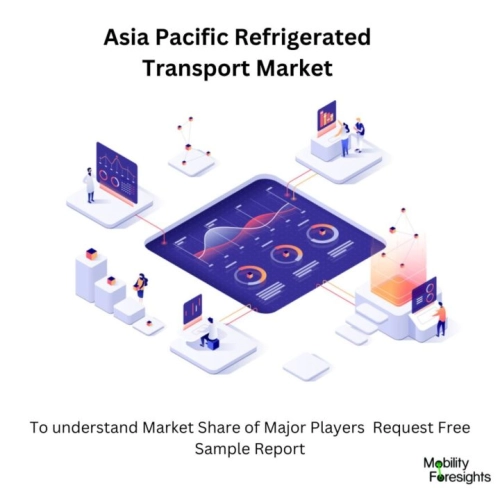
- Get in Touch with Us

Last Updated: Apr 25, 2025 | Study Period:
The Asia-Pacific refrigerated transport market is a crucial segment within the logistics industry, catering to the transportation needs of temperature-sensitive goods such as perishable foods, pharmaceuticals, and chemicals.
The Asia-Pacific refrigerated transport market has witnessed substantial growth, driven by increasing consumer demand for fresh and perishable goods. The marketâs expansion is fueled by the rising urban population, growing disposable incomes, and a burgeoning middle class in countries like China, India, and Southeast Asian nations. The market is expected to continue its upward trajectory due to these demographic and economic factors. The rapid growth of e-commerce, particularly in food and pharmaceuticals, is significantly influencing the refrigerated transport market. The demand for efficient delivery of perishable items to consumersâ doorsteps is driving the need for advanced refrigerated logistics solutions.
Increased urbanization and changing consumer lifestyles, including a preference for convenience and fresh products, are contributing to the demand for reliable refrigerated transport. Innovations in refrigeration technology, such as IoT-enabled temperature monitoring, GPS tracking, and energy-efficient cooling systems, are enhancing the efficiency and reliability of refrigerated transport. Stringent regulations governing food safety and pharmaceutical product handling are shaping the market. Companies are required to adhere to strict standards to ensure product quality and safety during transportation.
The market is highly competitive, with a mix of global and regional players offering a range of solutions. Key players are focusing on expanding their fleet capabilities, investing in technology, and offering tailored services to meet diverse customer needs.
Challenges include the high cost of advanced refrigeration technologies, maintaining energy efficiency, and addressing environmental concerns related to emissions and sustainability.
The Asia-Pacific refrigerated transport market is characterized by strong growth driven by e-commerce, urbanization, and technological advancements. Regulatory compliance and competitive dynamics are central to market development, with ongoing efforts to address challenges related to technology costs and sustainability.
The Asia-Pacific refrigerated transport market is a vital segment of the logistics and supply chain industry, focused on the transportation of temperature-sensitive goods that require specific environmental conditions. This market encompasses refrigerated trucks, trailers, and containers designed to maintain controlled temperatures for products such as perishable foods, pharmaceuticals, and chemicals during transit.
The Asia-Pacific region, with its diverse and rapidly growing economies, is experiencing a significant rise in demand for refrigerated transport solutions. This growth is largely driven by increasing urbanization, higher disposable incomes, and changing lifestyles that prioritize convenience and fresh produce. As urban populations expand and consumer preferences shift towards healthier and fresher food options, the need for reliable refrigerated transport has become more pronounced.
Rapid economic development in countries like China, India, and Southeast Asian nations is fueling demand for efficient and reliable transportation of perishable goods.
The boom in e-commerce, particularly in the grocery and pharmaceutical sectors, is creating a substantial need for refrigerated logistics to ensure timely and safe delivery of products to consumers. Innovations in refrigeration technology, such as IoT-enabled monitoring systems and energy-efficient cooling solutions, are improving the effectiveness and efficiency of refrigerated transport.
Stringent regulations governing food safety and pharmaceutical handling are influencing the market, driving companies to invest in technologies and practices that ensure compliance and maintain product integrity. The market is characterized by a mix of global and regional players competing to offer advanced, reliable, and cost-effective refrigerated transport solutions. Key players are focusing on expanding their fleets, integrating new technologies, and providing customized services to meet diverse customer needs.
The Asia-Pacific refrigerated transport market is experiencing robust growth driven by economic development, e-commerce expansion, and technological advancements. Regulatory compliance and competition are central to market dynamics, reflecting the sectorâs importance in ensuring the safe and efficient delivery of temperature-sensitive goods.
The Asia-Pacific refrigerated transport market is evolving rapidly, driven by several key trends that reflect changes in consumer behavior, technological advancements, and regulatory developments.
The expansion of e-commerce, particularly in food and pharmaceuticals, is a major trend influencing the refrigerated transport market. Consumers increasingly expect fresh and temperature-sensitive goods to be delivered quickly and reliably, driving demand for efficient refrigerated logistics solutions. The rise of online grocery shopping and direct-to-consumer pharmaceutical deliveries are significant contributors to this trend. Innovations in technology are transforming refrigerated transport. The integration of IoT and GPS tracking systems allows for real-time monitoring of temperature and location, enhancing supply chain visibility and reducing the risk of spoilage. Advanced refrigeration systems that offer better energy efficiency and temperature control are also becoming more prevalent.
There is a growing emphasis on reducing the environmental impact of refrigerated transport. Companies are investing in energy-efficient cooling technologies, exploring alternative fuels, and adopting sustainable practices to lower their carbon footprint. This trend aligns with global efforts to address climate change and regulatory pressures for greener logistics solutions. Stringent regulations related to food safety, pharmaceuticals, and environmental standards are shaping the market. Companies are required to comply with rigorous standards for temperature control and emissions, driving investments in technologies and processes that ensure compliance and product integrity.
Rapid urbanization in the Asia-Pacific region is driving demand for refrigerated transport. As urban areas expand and lifestyles change, there is an increasing need for reliable delivery of fresh and perishable goods to densely populated areas. There is an increasing demand for tailored refrigerated transport solutions that cater to specific needs, such as temperature ranges, cargo types, and delivery schedules. Companies are focusing on providing flexible and customized services to meet diverse customer requirements.
The Asia-Pacific refrigerated transport market is characterized by rapid growth in e-commerce, technological advancements, a focus on sustainability, stringent regulatory compliance, increasing urbanization, and a rising demand for customized solutions. These trends are shaping the market and driving innovation in refrigerated logistics.

New product development in the Asia-Pacific refrigerated transport market is driven by technological advancements, changing consumer demands, and regulatory requirements.
Innovations in refrigeration systems are enhancing efficiency and performance. Modern refrigerated transport solutions are integrating advanced cooling technologies, such as variable refrigerant flow (VRF) systems and energy-efficient compressors. These technologies improve temperature control, reduce energy consumption, and extend the lifespan of refrigeration units. The integration of Internet of Things (IoT) technology in refrigerated transport is a major trend. IoT-enabled sensors and GPS tracking systems allow for real-time monitoring of temperature, humidity, and vehicle location. This technology enhances supply chain visibility, improves compliance with regulatory standards, and reduces the risk of product spoilage or loss.
As environmental concerns grow, there is a shift towards electric and hybrid refrigerated transport vehicles. These vehicles offer lower emissions and reduced operating costs compared to traditional diesel-powered trucks. Companies are developing electric refrigerated trucks that maintain performance while minimizing environmental impact, aligning with global sustainability goals.
The use of advanced insulation materials is improving thermal efficiency in refrigerated transport. New insulation technologies, such as vacuum insulated panels (VIPs) and high-performance foam materials, are being integrated to maintain optimal temperatures and reduce energy consumption. Innovative fleet management solutions are emerging, incorporating AI and machine learning to optimize routing, monitor vehicle performance, and predict maintenance needs. These systems enhance operational efficiency and reduce costs by improving logistics and reducing downtime.
New product development in the Asia-Pacific refrigerated transport market focuses on advanced refrigeration technologies, real-time monitoring through IoT, electric and hybrid vehicles, modular solutions, enhanced insulation, and smart fleet management. These innovations aim to improve efficiency, sustainability, and adaptability in the transport of temperature-sensitive goods.
| Sl no | Topic |
| 1 | Market Segmentation |
| 2 | Scope of the report |
| 3 | Research Methodology |
| 4 | Executive summary |
| 5 | Key Predictions of the Asia-Pacific refrigerated transport Market |
| 6 | Avg B2B price of Asia-Pacific refrigerated transport Market, By Region |
| 7 | Major Drivers For Asia-Pacific refrigerated transport Market |
| 8 | Asia-Pacific refrigerated transport Market Production Footprint - 2023 |
| 9 | Technology Developments In Asia-Pacific refrigerated transport Market |
| 10 | New Product Development In Asia-Pacific refrigerated transport Market |
| 11 | Research focus areas on new Asia-Pacific refrigerated transport |
| 12 | Key Trends in the Asia-Pacific refrigerated transport Market |
| 13 | Major Projects Utilizing Asia-Pacific refrigerated transport |
| 14 | Market Size, Dynamics And Forecast, By Geography, 2024-2030 |
| 15 | Market Size, Dynamics And Forecast, By Type of vehicle, 2024-2030 |
| 16 | Market Size, Dynamics And Forecast, By Temperature range, 2024-2030 |
| 17 | Market Size, Dynamics And Forecast, By End User, 2024-2030 |
| 18 | Competitive Landscape Of Asia-Pacific refrigerated transport Market |
| 19 | Mergers and Acquisitions |
| 20 | Competitive Landscape |
| 21 | Growth strategy of leading players |
| 22 | Market share of vendors, 2023 |
| 23 | Company Profiles |
| 24 | Unmet needs and opportunity for new suppliers |
| 25 | Conclusion |